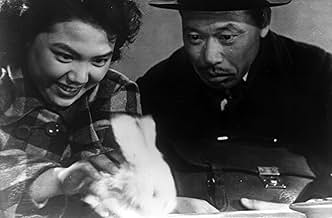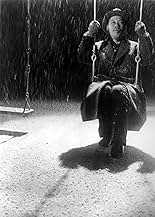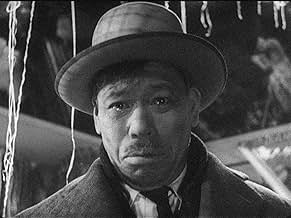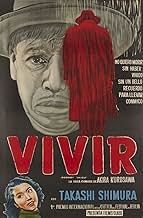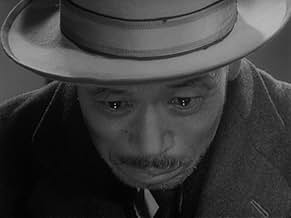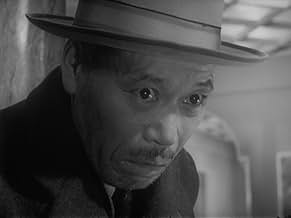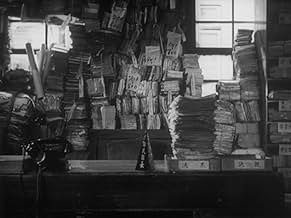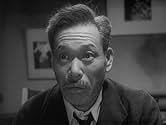A bureaucrat tries to find meaning in his life after he discovers he has terminal cancer.A bureaucrat tries to find meaning in his life after he discovers he has terminal cancer.A bureaucrat tries to find meaning in his life after he discovers he has terminal cancer.
- Director
- Writers
- Stars
- Nominated for 1 BAFTA Award
- 6 wins & 2 nominations total
- Director
- Writers
- All cast & crew
- Production, box office & more at IMDbPro
8.3100.2K
1
2
3
4
5
6
7
8
9
10
Featured reviews
Another fabulous film from Kurosawa.
Kanji Watanabe discovers that he has cancer, and tries to seek some sort of meaning in his final days, he becomes aware that he's operated as a cog in the giant domestic machinery, and fights against the system.
I've been working my way through The Kurosawa films, and thus far I've been impressed with the lot, I'll be honest, I expected a Samurai film, and when it became apparent that that wasn't the case either, I thought it may have been a mystery, it wasn't that either, instead it turned out to be a rather intimate, absorbing character study.
It shows that despite being essentially part of a machine, Kanji has a very human side, only he realises it too late.
This film moved me to tears on occasion, it had me laughing, it certainly had be captivated for the whole running time. That moment where Kanji explains what's happening to his son, it was phenomenal.
I am learning more about Kurosawa with each film I watch, but I must admit, this one threw me totally off guard, it wasn't what I was expecting, it further enhances my realisation that Kurosawa was a genius.
Remember all work and no play! There's a really meaningful message in this film.
9/10.
I've been working my way through The Kurosawa films, and thus far I've been impressed with the lot, I'll be honest, I expected a Samurai film, and when it became apparent that that wasn't the case either, I thought it may have been a mystery, it wasn't that either, instead it turned out to be a rather intimate, absorbing character study.
It shows that despite being essentially part of a machine, Kanji has a very human side, only he realises it too late.
This film moved me to tears on occasion, it had me laughing, it certainly had be captivated for the whole running time. That moment where Kanji explains what's happening to his son, it was phenomenal.
I am learning more about Kurosawa with each film I watch, but I must admit, this one threw me totally off guard, it wasn't what I was expecting, it further enhances my realisation that Kurosawa was a genius.
Remember all work and no play! There's a really meaningful message in this film.
9/10.
a cinematic experience that's a near-nexus of existentialism- life, living, dying, death, and can be done while alive- remarkable
Akira Kurosawa knew how to get in touch with human nature through his art. With his visual expressiveness and storytelling, he could pierce through his subjects, even in his big and occasionally comical samurai films, and find the elemental things do work. What he probably learned off of Rashomon probably helped out with Ikiru (To Live), a story of an old man who finds out he will die within a year, as both stories deal with perceptions of the significance of a life spent and a life wasted. Though that was to a different degree in Rashomon, with Ikiru Kurosawa expands into full-on existentialism.
The old man Kanji Watanabe (in a wholly believable and often heart-breaking performance by Takashi Shimura) knows his life hasn't amounted to much as a (chief) clerk for the city. He knows he hasn't had a great kinship with his son. He's accepting his fate with a heavy soul. One of the tenets of existentialism is that there's free-will, and the responsibility to accept what is done with one's life. Kurosawa might've (as I speculate, I don't entirely know) caught onto this for his lead, and it works, especially with the little details.
Such little details, unforgettable ones, have been expounded upon by other reviewers and critics, such as the drunken, sullen singing of "Life is short, fall in love my maiden" in the bar. A scene like that almost speaks for itself and yet it's also subtle. But one scene that had me was one not too many talk about. It's when Watanabe is in the Deputy Mayor's office, asking for permission so that a park can be built. At first the Mayor ignores him, but then Watanabe begs, but not in a way that manipulates the audience for sympathy with the old man. The mayor must be sensing something in his eyes, desperate and weak, however determined, and it's something that probably most of the audience can identify with as well, even if they don't entirely identify with the character.
But aside from the emotional impact Ikiru can have on a viewer, composition-wise (with the help of Asakazu Nakai, wonderful cinematographer on less than a dozen Kurosawa films) and editing-wise the film is ahead of its time and another example of Kurosawa's intuitive eye. There are some to-tomy shots sometimes (which could be called typical via master Ozu or other), but everything appears so precise on a first viewing, so descriptive. I think I almost can't go into all of them without a repeat viewing, but there were two that are still fresh in me. The first was right as Watanabe was about to sing in the bar, and there were these bead-strings looming in front of the camera. Perhaps mysterious, but definitely evocative.
The other was when Watanabe and one of the other clerks are on a bridge during a dark part of the day. Both characters are in silhouette, and Watanabe gives an indication to the character that he will die soon. But for me, I wasn't even paying a terrible amount of attention to the words. The way the two are lit as they are, with the light in the background and darkness in the foreground, it could maybe give an indication of what Kurosawa's trying to say: we're all not in the light of life, but it doesn't have to be an entire down-ward spiral if the will is good. Whether you're into philosophy (ies) or not, Ikiru won't disappoint newcomers to Kurosawa via his action pictures. A+
The old man Kanji Watanabe (in a wholly believable and often heart-breaking performance by Takashi Shimura) knows his life hasn't amounted to much as a (chief) clerk for the city. He knows he hasn't had a great kinship with his son. He's accepting his fate with a heavy soul. One of the tenets of existentialism is that there's free-will, and the responsibility to accept what is done with one's life. Kurosawa might've (as I speculate, I don't entirely know) caught onto this for his lead, and it works, especially with the little details.
Such little details, unforgettable ones, have been expounded upon by other reviewers and critics, such as the drunken, sullen singing of "Life is short, fall in love my maiden" in the bar. A scene like that almost speaks for itself and yet it's also subtle. But one scene that had me was one not too many talk about. It's when Watanabe is in the Deputy Mayor's office, asking for permission so that a park can be built. At first the Mayor ignores him, but then Watanabe begs, but not in a way that manipulates the audience for sympathy with the old man. The mayor must be sensing something in his eyes, desperate and weak, however determined, and it's something that probably most of the audience can identify with as well, even if they don't entirely identify with the character.
But aside from the emotional impact Ikiru can have on a viewer, composition-wise (with the help of Asakazu Nakai, wonderful cinematographer on less than a dozen Kurosawa films) and editing-wise the film is ahead of its time and another example of Kurosawa's intuitive eye. There are some to-tomy shots sometimes (which could be called typical via master Ozu or other), but everything appears so precise on a first viewing, so descriptive. I think I almost can't go into all of them without a repeat viewing, but there were two that are still fresh in me. The first was right as Watanabe was about to sing in the bar, and there were these bead-strings looming in front of the camera. Perhaps mysterious, but definitely evocative.
The other was when Watanabe and one of the other clerks are on a bridge during a dark part of the day. Both characters are in silhouette, and Watanabe gives an indication to the character that he will die soon. But for me, I wasn't even paying a terrible amount of attention to the words. The way the two are lit as they are, with the light in the background and darkness in the foreground, it could maybe give an indication of what Kurosawa's trying to say: we're all not in the light of life, but it doesn't have to be an entire down-ward spiral if the will is good. Whether you're into philosophy (ies) or not, Ikiru won't disappoint newcomers to Kurosawa via his action pictures. A+
The most moving and human film I have ever seen.
I can safely say that I have seen no finer film than Kurosawa's true masterpiece, Ikiru. The story of a dying petty bureaucrat in 1950's Japan, Ikiru is as uncompromisingly honest and beautiful a film as has ever been made on the subject of life. Kurosawa elevates a story that could have been simple melodrama to the level of masterwork with a genuine love of his characters, and with an incredible technical direction. The film's structure accentuates and deepens its many, many lessons on life, and the performances, including a heartbreakingly earnest turn by Shimura are all flawless.
In short, Ikiru is easily one of the greatest works committed to film, and no discerning film aficionado should avoid experiencing it. Had Kurosawa directed only this film, it would still be enough to include him in the pantheon of the greatest storytellers who ever lived. Fortunately for us, it is simply the pinnacle of a staggeringly amazing career. It is the absolute definition of a 10/10 film.
In short, Ikiru is easily one of the greatest works committed to film, and no discerning film aficionado should avoid experiencing it. Had Kurosawa directed only this film, it would still be enough to include him in the pantheon of the greatest storytellers who ever lived. Fortunately for us, it is simply the pinnacle of a staggeringly amazing career. It is the absolute definition of a 10/10 film.
Simply Brilliant - Kurosawa's Greatest
Kanji Watanabi is a quiet, melancholy man who has spent all his life behind his office desk doing sweet eff-all. When he is diagnosed with stomach cancer he realizes that he has been petty much dead his whole life, and searches desperately for away to live again.
This is Akira Kurosawa's masterpiece, yes, even better than Rashomon and The Seven Samauri. It is a perfect true story of everybody's life- how we don't even realize we have it until we know it will be over in a short while. Watanabi's quest for self-discovery is one of the greatest from any motion picture ever made. The all-too-true paradox is one to end all paradoxes- that Watanabi is dead, and had been all his life, until he realized he was sick, which is when he began living for the first time. Takashi Shimura, the actor best known for his role as the wise, bald-headed Samauri in The Seven Samauri, and the professor out of the early Godzilla films, plays Watanabi perfectly- in my mind, it's one of the greatest film performances of all time.
Not everyone will love this movie. It was made a long time ago, the main character is an old fogey, it has subtitles, and it's pretty long. Many people today, especially young kids, would find it boring. Well, let 'em. There's no need to worry about them, they'll always have Pirates of the Carribbean, they'll always have The Matrix. Leave Ikiru and films like it to the true lovers of cinema.
This is Akira Kurosawa's masterpiece, yes, even better than Rashomon and The Seven Samauri. It is a perfect true story of everybody's life- how we don't even realize we have it until we know it will be over in a short while. Watanabi's quest for self-discovery is one of the greatest from any motion picture ever made. The all-too-true paradox is one to end all paradoxes- that Watanabi is dead, and had been all his life, until he realized he was sick, which is when he began living for the first time. Takashi Shimura, the actor best known for his role as the wise, bald-headed Samauri in The Seven Samauri, and the professor out of the early Godzilla films, plays Watanabi perfectly- in my mind, it's one of the greatest film performances of all time.
Not everyone will love this movie. It was made a long time ago, the main character is an old fogey, it has subtitles, and it's pretty long. Many people today, especially young kids, would find it boring. Well, let 'em. There's no need to worry about them, they'll always have Pirates of the Carribbean, they'll always have The Matrix. Leave Ikiru and films like it to the true lovers of cinema.
Beautiful & touching, also very clever
This film touched me in a way no other film has. Filmed in black and white and gorgeous, both in the visuals and in how the story unfolds. Behold the clever manner of gradually unfolding the story as people jog each other's memories at his funeral (an obligation for them, that gradually turns into a real eulogy). Everything is told in flashbacks: the mourners' memories unfold naturally, as people remember what the man did and struggle to comprehend why.
This film I would nominate for the golden five of the century!
I first saw it in 1956 or so at a small theater in downtown Chicago. A second viewing, years later, confirmed my initial pleasure!
This film I would nominate for the golden five of the century!
I first saw it in 1956 or so at a small theater in downtown Chicago. A second viewing, years later, confirmed my initial pleasure!
Did you know
- TriviaWhen Takashi Shimura rehearsed his singing of "Song of the Gondola," director Akira Kurosawa instructed him to "sing the song as if you are a stranger in a world where nobody believes you exist."
- GoofsWhen Kanji and the Novelist go to a busy, loud nightclub, the film has been reversed as evidenced by the backwards "Nippon Beer" banner in the background.
- ConnectionsFeatured in The Siskel & Ebert 500th Anniversary Special (1989)
- SoundtracksJ'ai Deux Amours
(uncredited)
Music by Vincent Scotto
Lyrics by Georges Koger and Henri Varna
Performed by Josephine Baker
[Played when entering the bar with the long-faced man]
Details
Box office
- Gross US & Canada
- $60,239
- Opening weekend US & Canada
- $2,149
- Dec 29, 2002
- Gross worldwide
- $114,026
- Runtime
- 2h 23m(143 min)
- Color
- Sound mix
- Aspect ratio
- 1.37 : 1
Contribute to this page
Suggest an edit or add missing content

![Watch Trailer [OV]](https://m.media-amazon.com/images/M/MV5BMTg4OWJkNjMtM2Y0Mi00MzQ5LTk3Y2YtZWMwNGUyOTIyNGVjXkEyXkFqcGdeQXRyYW5zY29kZS13b3JrZmxvdw@@._V1_QL75_UX500_CR0)
